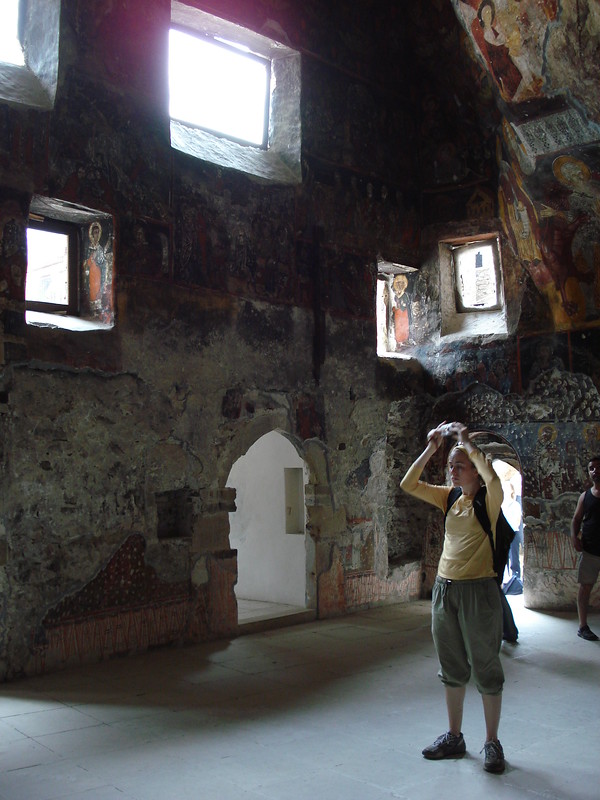Introduction
If you pay attention to religious discussions, you must have heard many people argue that religion goes with backwardness and secularism goes with progress, like butter goes with bread.
I am particularly concerned about the form of that argument that goes something like this: “The Europeans that brought Christianity to Africa are now secularized, so Africa should follow suit and stop being backward.”
A recent example will help you understand what I am describing.
Bolu Okupe, the son of Doyin Okupe, former special assistant to former Presidents Olusegun Obasanjo and Goodluck Jonathan, recently came out as gay in an Instagram post.
In response to his “coming out” post, another Instagram user commented, “Somewhere (in) Kenya, you could be a corpse. We Black coloured Never go against our God! Stay with your stupidity in France (sic).” In response to this post, Bolu said:
“Your whole mentality is tragic. I feel sorry for you. Your religion has turned you into a psychotic imbecile that you think it’s okay to kill people? First, you said to stay in France with your stupidity; sir, who do you think gave Africans Christianity? The French and the English pushed the religion on you that you are calling.
“Black coloured, you should educate yourself a bit. Second, the Europeans who gave you your religion has since moved past that because the world has developed while people like you are still stuck in the 18th century. You should know that the same religion that you so deeply cherish justified people to enslave your ancestors in the past.
“You are delusional. I hope one day you will educate yourself. If not, I don’t care; you will die ignorant and on the wrong side of history. (sic)”
We can admit right at the start that the Instagram user’s comment about the killing of homosexuals is wrong (as is the killing itself). You should not kill people on the street because they are gay (except the laws of the land makes homosexuality punishable by death, in which case it is a judicial decision by appropriate authorities). But that is not the focus of this article.
Also, I will have more to say about slavery and Christianity in the future.
Focus for a moment on these two thoughts (which are important to the topic at hand):
- Who do you think gave Africans Christianity? The French and the English pushed the religion on you that you are calling.
- Second, the Europeans who gave you your religion have since moved past that because the world has developed while people like you are still stuck in the 18th century.
Bolu makes that popular argument that since those who brought Christianity to Africa have moved on from it (the premise), then Africans must also move on and stop being backward (the conclusion).
This particular argument tends to resurface when African Christians defend a conservative or traditional Christian understanding of any cultural issue, say homosexuality, abortion, and premarital sex. When they take such conservative views on such matters, people like Bolu are quick to repeat this line of argument.
But there are too many fallacies in this argument for us to allow them to keep making it. Bolu appears to be making a good historical and cultural argument when he is, in fact, committing so many philosophical errors. Like they say, not everything that glitters is gold. Some dross gets dressed up as gold.
Let’s take some time to look beyond the appearances and look at the argument.

Christianity in Africa
The first thing to say is that Europeans did not bring Christianity to Africa.
The book of Acts was definitely written before AD70. The book ended with Paul’s prison ministry in Rome. It didn’t mention Nero’s persecution, Paul and Peter’s death, and the destruction of the Jerusalem Temple in AD 70. Therefore, the events in Acts took place before AD 70.
Right in chapter 8 of Acts (verses 26-40), we have the conversion of a eunuch from Ethiopia. This eunuch was in charge of the treasury of the Kandake (queen of the Ethiopians). Ethiopia is an African country, so we have the first written testimony of an African becoming a Christian.
As Christianity advanced to the west, it moved south across the Mediterranean to North Africa, with Carthage (present-day Tunisia and Algeria) as the central focus. It was a bishop-led church where “every town and almost every village had its bishop” (Bruce Shelley, Church History in Plain Language, 86). Tertullian and Cyprian (popular church fathers) were from Carthage.
From Carthage, Christianity moved east to Cyrene (present-day Libya). Before this, we already saw Simon, a man from Cyrene carrying Jesus’ cross (Mark 15:21), and some people from Cyrene at Pentecost (Acts 2:10). Men from Cyrene were part of the missionary endeavors in Antioch (Acts 11:20). “We know that by the fifth century, a half dozen bishops labored in the area” (Ibid, 88).
Then there was Alexandria (Egypt), which became an important center in early Christianity. Important church fathers like Clement, Origen, and Athanasius were from Alexandria. The bishop of Alexandria was also the archbishop supervising other metropolises. Alexandria was also involved in many of the church’s early theological debates, including the Easter controversy.
One of the most important figures in early Christianity-Augustine- was from Hippo, North Africa. Many church councils were held in Hippo (393, 394, 397, 401, 426AD).
In the fourth century, King Ezana of Aksum (present-day Eritrea and Ethiopia) made Christianity the official religion of his country.
Though Islam’s advance would affect the spread of Christianity in Africa, it was still alive and well in Ethiopia and present in North Africa.

Christianity did not originate in Europe
It’s also important to say briefly that Christianity did not originate in Europe. Christianity started in Jerusalem, Palestine and spread out to Antioch (Syria), Edessa (Greece), Ephesus (Asia Minor, today’s Turkey), Rome, and some European cities like Gaul (present-day France), Spain, and Britain.
Whatever may be said about Europeans bringing Christianity to Africa, we should not think that Christianity originated in Europe. Europe was a great missionary springboard especially in the 18th and 19th century, but Christianity is not a European thing.
But more on that later.

Imperialism and the spread of Christianity in Sub-Saharan Africa
The purpose of the preceding is not to deny the role the Europeans played in the spread of Christianity but to seek historical accuracy. Christianity was alive and well in Africa before the 16th century.
However, the 16th century saw more intensification of Christian missionary endeavors in Africa. Portugal and Spain (and later Britain) came to Africa in the 15th century to expand their imperialist agendas.
Though Christianity (Greek Orthodoxy) was already present in Ethiopia and Zimbabwe, Jesuits from Portugal brought Catholic Christianity to Ethiopia and Zimbabwe (and later to Mozambique and Angola) in the 16th century.
In West Africa, the Europeans first focused on the slave trade rather than the Christianizing of West Africa. Much of the efforts to bring the gospel to West Africa would coincide with the 18th and 19th century’s protestant missions.
Christians from Nova Scotia settled in Sierra Leone in 1787, and J.T. van der Kemp came to Cape Town twelve years later. From there, the gospel moved to Liberia, Ivory Coast, and Gabon.
Years later (1841), Livingstone would arrive in Africa. Cardinal Lavigerie (a catholic) would also exert great influence on the spread of Christianity.
We could go on and on, but it’s easy to establish that Christianity indeed spread in Sub-Saharan Africa due to the influence of European Missionaries.

Pushed the religion on you?
Bolu said the French and English pushed Christianity on Africa. However, what we have seen so far does not suggest the use of force or compulsion. When Christianity came to North Africa in the early years, it was through the efforts of missionaries. When it came to Sub-Sahara Africa centuries later, it was through the effort of missionaries.
Describing the efforts of the Europeans, Samuel Adu-Gyanfi and Benjamin Kye Ampadu said:
“The achievement of the purpose of these Christian Missions came with some costs. Several missionaries died at a youthful age due to the unfriendly tropical climate. Again, in West-Africa, the efforts to go beyond the coast to reach those inland with the gospel coincided with the southwards expansion of Islam which posed some threat to the expansion of the work of Christian evangelizing missions. The work of the missionaries also had little success initially. The people received the message with indifference. It was however in the coastal territories filled with mulattos and other European trading communities that Christianity won some of its early success.”
Notice that many of these missionaries exposed themselves to unfriendly weather to bring the gospel to Africa. Notice also that Islam was also spreading and active during this period. Furthermore, notice that the missionaries’ work received little success initially because the people were indifferent (with many preferring their traditional religions).
To look at all these and claim that Christianity was pushed on Africans makes no historical sense. It’s like saying giving a map to a man who lost his way means I pushed him to go to the direction the map led him. No! He accepted the map himself and decided to follow it.
It was not the early imperialists who were issuing decrees mandating Christianity-they were too busy with the slave trade and their imperial pursuits. It was Jesuits from Portugal and then protestant missionaries from across Europe that risked their lives to Christianize Africa.
To use a language that suggests force (physical or non-physical) is to undermine the missionaries’ sacrifices and the genuine acceptance of their message by intelligent Africans who had their own minds.
Moreover, the Christian missionaries spearheaded efforts in education, health, commerce, vocational skills, and the suppression of the slave trade in Sub-Saharan Africa, largely in cooperation with the citizens and their leaders.
Africans saw the positive impacts that Christianity had in their societies, and they willingly converted in their numbers.
The question of motive
Many people will argue that the Europeans had bad motives for Christianizing Africa- perpetuating imperialism being one of them.
Leaving aside the truthfulness or falsity of this claim, the first thing to say is that the motive for doing a thing does not define the moral character of what is done. It may define the moral character of the doer, but not the deed.
In Paul’s days, some preached the gospel of Christ out of envy and rivalry (Philippians 1:15). They did it to put it in Paul’s face, so to say. They wanted to stir up trouble for Paul while he was in prison. They had selfish motives for preaching the gospel. What was Paul’s response? “But what does it matter? The important thing is that in every way, whether from false motives or true, Christ is preached. And because of this I rejoice” (verse 18).
God raised the Assyrians to punish Israel for their sin (Isaiah 10:5-6). But their motive for fighting the battle was not justice but imperialism (verses 7-11).
Those who wanted to spite Paul were guilty of their false motives, but that didn’t make the gospel they preached false. Assyrians were guilty of their destructive imperial motives, but it didn’t make evil the just punishment of Israel for their sins.
A man may give a dying man food to earn praise and applaud from his Twitter followers, but that does not change the fact that giving to dying men is a good thing. Someone may become a philanthropist as a form of money laundering but that does not change the fact that helping the poor and underprivileged is good.
Even if we agree, for argument’s sake, that the missionaries had bad motives, that is not a statement on Christianity’s truthfulness and goodness.
Is Christianity true? Has it saved people from their sins? Is Christianity good? Has African life flourished because of Christianity? Those are the important questions to ask. If we answer yes to those (which we must), then the missionaries’ motives are irrelevant to this particular discussion.

So who brought Christianity to Africa?
Short answer? God did.
God promised Abraham that he would make a nation out of him, and from that nation, he would bless all the nations of the earth. (Genesis 12-17).
God fulfilled his promise when he chose Israel (Exodus 4:22), delivered them from Egypt, and made them a nation. He specially revealed himself to them and gave them a sacrificial system and laws that prefigure the salvation to come to Israel and the whole world.
Israel was a sinful nation that broke God’s covenant with them. Instead of bringing blessing to the nations, they imported the nations’ idols and corrupted themselves. Instead of shining light to darkness, they were overwhelmed by the darkness. The salt lost its taste and the light went out. God would send them to exile as a punishment for their covenantal unfaithfulness.
But before they went to exile, he promised that he would restore them from exile and establish a new covenant with them (Jeremiah 31:31-34). He would send his servant to fully and finally deal with sin and rescue them from their perpetual unfaithfulness.
However, when this servant of the Lord comes, he would also be a light to the gentiles (Isaiah 42:6) and establish a rule of justice and righteousness among the nations (Isaiah 42:1, 3-4, 51:4-6). God’s salvation would reach the ends of the earth (Isaiah 49:6) through this servant of the Lord.
But this servant of the Lord will be from Israel. He would be a Davidic king (2 Samuel 7) from David’s lineage (Isaiah 11).
Jesus Christ was that servant of the Lord; He was the fulfillment of all the Old Testament types (Luke 2:11). He came to save Israel from their sins and covenantal unfaithfulness (Luke 2:38). But his salvation would indeed extend to the ends of the earth (Luke 2:29-32). He commissioned his Jewish disciples to take the gospel to the ends of the earth (Mathew 28:18-20, Acts 1:4-8) so that the blessing of Abraham would finally come to both Jews and Gentiles (Galatians 3:7-9, 26-29).
It is God who accomplished salvation through his Son and decided to bring it to the ends of the earth. Through his missionaries, he took that gospel to Asia Minor, North Africa, Rome, Europe, America, Sub-Sahara Africa, etc.
The Europeans did not come to dump Christianity on us. No! God used them to bring the gospel to Africa (whatever their motives might have been), just like he used Palestinians and Romans to take the gospel to Europe.
God is the one causing Abraham’s blessings to go to the ends of the earth, and we must be kidding if we think he won’t shine the light of the gospel in Africa. Whatever means he chose to use (Europeans, Americans, or Middle Easterns), it was inevitable (just like it is inevitable in every region on earth). Why? Because the knowledge of God will cover the whole earth as the waters cover the sea (Habakkuk 2:14). Africa could not have escaped it. Who can stand against what God has decreed (Ephesians 1:11)? The only region on earth that can escape the gospel is where the sun does not shine in the day and the moon in the night.
Europe was in darkness before the gospel came (they were barbarians). Africa was in darkness before the gospel came. Every nation that had/has a pre-Christian existence was/is in darkness before the gospel came/comes on the scene. This was not uniquely African. So Europeans were not the ones liberating us; God liberated us just like he liberated them. And he chose them to do it for us in Sub-Saharan Africa like he chose Jews and Romans to do it for them.
So no one can boast. We were all in darkness before the light shined on us (2 Corinthians 4:5-6). And no one can feel inferior that another set of people brought the gospel to them, for all of us had the gospel brought to us from outside ourselves.
“See, darkness covers the earth and thick darkness is over the peoples, but the LORD rises upon you and his glory appears over you” (Isaiah 60:2).
And this light will shine as far as darkness exists (the earth, the peoples). Christ came to make his blessings flow, as far as the curse is found. And he will use imperfect people (maybe with poor motives) to shine that light and make the blessing of Abraham flow.

The problem with a linear view of history
The linear view of history is a social evolutionary way of looking at history. From this perspective, history is a continuum of progress and advance such that today is always better than yesterday and tomorrow better than today.
But such a view of history is inaccurate and fallacious.
There are periods in history where we see progress, then decline, then progress, and the cycle continues.
Bolu assumes that by moving from a Christian civilization to a secular civilization, Europe is making progress. This reasoning shows he most likely holds to a social evolutionary view of history.
But there are times in history when supposed “progress” ended up being declines and societies had to make a U-turn.
Many countries in Asia and Europe experimented with communism in the 20th century. They all had utopian visions-communism will usher in the ideal and perfect society where all is bliss and progress. But the reality of the 20th century is that communism births totalitarianism, and instead of utopia, it produces a dystopia. Put simply, it overpromises and underdelivers. It promises mansions and delivers slums; abundance but deliveres hunger.
The killings in the Soviet Union, Cambodia, Cuba, China, Hungary, Poland, East Germany, Bulgaria, Romania, among others, are well documented. Some estimate the death toll from these 20th-century communist regimes to 100million and above.
So if society is always on an upward trajectory, how do we explain the 20th century? Add World War 1 and 2 to the mix, and the death toll is unimaginable.
What worldview was behind those communist regimes? It was a secular, anti-religion, utopian worldview-the kind that people like Bolu praise and adore.
From the above, you should learn that moving from point A to point B is not necessarily progress. Europe moving from the pre-modern times to the post-modern age has not necessarily experienced progress. Many nations in Asia and Europe had to leave communism behind and embrace a varying measure of free market capitalism and free institutions.
Secondly, the idea that moving from a religious to a secularized society is progress because secularized states are the ideal for human flourishing is nonsense. Secularism and anti-God ideologies decimated Europe and Asia in the 20th century.
Also, comparing the middle ages and the reformation and post-reformation ages in Europe with current Europe in purely economic terms is misguided. What do I mean? It is foolish to say that secularism is great because secularized Europe in 2021 has a better standard of living than religious Europe in say 1530.
The first problem with this is that you are comparing apples and oranges. We don’t know what Europe would have become, economically speaking, if religious Europe never gave in to secular Europe. The industrial revolution that led to the technological developments that improved Europe’s economy was not a product of secularism. For one thing, the industrial revolution began (1760) before the French Revolution (and the French revolution was the harbinger of a secularized Europe).
Secondly, America, founded as a Christian civilization by immigrants from Europe, is now the most successful nation globally (economically speaking, measured in GDP). And America became an economic powerhouse (ahead of European countries) before its secularization. Therefore, it cannot be argued that secularism inherently leads to economic progress.
Thirdly, a nation might be secularized while still borrowing capital from its religious past. Martin Luther’s (the protestant reformer) work popularized the concept of the dignity of labour in Europe. After many centuries of living by that principle, it becomes a generational inheritance. Even if a generation later inherits it without recognizing or admitting its Christian roots, it doesn’t change the fact that they inherit a Christian heritage.
But the lasting impacts of the protestant reformation, a Christian reformation that shaped Europe, are more extensive. Daniel Peterson of Desert News said:
“While the rise of popular education was in large part based on the invention of printing and the subsequent availability of relatively cheap books, lay education was also intimately tied with the Reformation. Church leaders understood that people could believe and support church doctrine only if they understood it. The uneducated were more easily swayed by “every wind of doctrine” and human “cunning” (Ephesians 4:14); hence they needed to be taught correct doctrine by church- and state-sponsored schools. Until recently, public education in Europe generally included required church-sponsored religion classes.”
In essence, Daniel is saying that the mainstreaming of education in Europe was partly a product of the protestant reformation. That capital from the protestant reformation is one major reason for whatever progress Europe is experiencing.
Peterson went on, “Perhaps the most subtle impact of the Reformation was the legitimization — even institutionalization — of questioning authority. Initially, the Reformers questioned the authority of the Pope and Catholic tradition. But if the Pope’s authority could be questioned, why not a judge’s? Or a doctor’s? Or the king’s?
The idea that any received tradition could — and even should — be questioned helped lay the foundation for the scientific revolution in Western Europe, as well as for eventual political revolutions in America and throughout Europe. Eventually even biblical authority — the heretofore unshakable rock of the Reformation — was likewise questioned.”
Modern science has its roots in Christian civilization. The popularity of a republican system of government has its roots in Christian civilization. The Treaty of Westphalia encouraged the development of nation-states and the dissolution of imperial empires, which opened the way for greater advancement in international politics by fostering healthy competition among the nation-states.
All of the above to say that calling the secularization of Europe progress is simplistic. Therefore, urging African countries to follow Europe on that path is nonsense.
If Christianity had all these impacts on Europe and its effects are still reverberating in their secularized cultures, does it makes sense to encourage African countries to move away from it? Who is to say that a sustained faithfulness to biblical Christianity (I am not talking about the health and wealth, prosperity, miracles gospel that has now invaded Africa) in Africa will not produce much better fruits if it’s still producing fruits in largely secularized Europe?
Suppose Mr. A was suffering from depression and was on the verge of giving up on life. Suppose Mr. B came through for him and helped him to embrace life. Mr. A took Mr. B’s advice and became a successful, happy, and accomplished man. Suppose that Mr. B ended up committing suicide. Should Mr. A return to his former state since the person that made him embrace life has given up on life?
Even if Europe gives up on Christianity, it does not change the fact that Christianity has been responsible for its flourishing and that the seeds it planted are still producing fruits in Europe inspite of its secularization. Therefore, African Christians can look at those fruits and keep holding on to the Christian values that produced them without following Europe on the path it has now chosen (a path that gave us the horrors of the 20th century).
I believe what Africa needs is an embrace of biblical Christianity and a rejection of the health and wealth, prosperity, miracles gospel that has invaded our space. It was the recovery of biblical Christianity that transformed Europe; it will do the same for us if we embrace it. If Africa is in a mess, it is not because Christianity is dragging us down but because we have embraced a counterfeit. Biblical Christianity has never dragged any culture down.
In essence, we don’t need to be becoming less Christian, we need to become more Christian while we reject false gospels for the true gospel of Jesus Christ.

Christian Orthodoxy
Another bad point Bolu makes (indirectly) is that to oppose homosexuality is somehow to remain in the 18th century and that we only do that because we Africans are backward.
The truth is there are millions of evangelical Christians in America who oppose homosexuality. And there are millions more in Europe who oppose homosexuality. Rejecting homosexuality is not a matter of which century you live in but whether you are holding on to Christian orthodoxy (as opposed to the progressive Christianity of the modern age, you can also call it biblical Christianity).
Christian orthodoxy (by which I am not referring to the Greek Orthodox Church) is independent of geography. There are evangelical Christians all over the world who, reading the same bible, will tell you why homosexuality is a sin and should be delegitimized. African Christians are not rejecting homosexuality because we are still living in the 18th century. Orthodox Christians everywhere are doing the same. It’s not a cultural thing but a biblical commitment.
And if it is Christian Orthodoxy that is behind our rejection of homosexuality, Bolu should brace up because there will only be more of that. The light of the gospel will conquer the darkness in every language, tongue, tribe, and people. Christian Orthodoxy will become more prevalent, not less. God has given all the ends of the earth to Christ, and he will take possession of what God has given him (Psalms 2:6ff). And the ends of the earth do not exclude Europe or America, or Pakistan or North Korea.
As the knowledge of the Lord floods the earth, progressive Christianity will be exposed for the lie that it is, and orthodox Christianity will flourish.
Whatever might be the current state of things, we know where the story is going. God, the sovereign ruler, has shown us in symbolic language (the book of Revelation) how everything wraps up. It is Christ and his gospel that conquer and win. Knees will keep bowing, and tongues will keep confessing. The light of the gospel will shine in dark places and in enlightened places that have become dark. And it will shine more brightly in lightened places. This gospel is not going anywhere; it will keep flooding the earth until the earth is as full of the knowledge of God (biblical, orthodox Christianity) as the waters cover the sea.
Orthodox African Christians are not going back to the 18th century; they are only preparing for the future. It’s a journey forward, not backward. We are going where the nations of the earth will come to. All nations of the earth will join us in that journey, and it will be massive. That future is so bright and glorious. If God chooses Africa to lead that journey, great. But this journey will not be an African journey. It’s God’s journey, and he will bring all nations of the earth on board. Europe and America will not be missing. No language, tongue, tribe, and people will be missing.

Conclusion
Bolu mentioned that those who don’t follow secularization would end up on the wrong side of history. However, whether you are on the wrong or right side of history depends on where history is going. If you think history is going towards more and more secularization, but it doesn’t, you are the one on the wrong side of history.
There is a God in heaven who created space and time and everything in heaven and earth. He is the God of history. He is the one who designed the course of history. He doesn’t just know history; he designed everything that happened, is happening, and will happen. Because he is the sovereign ruler over time, he is the one who knows where history is going.
And he has told us that history is going towards uncountable people from every tongue, tribe, language, and people, worshipping God (Revelation 5:9) and following the lamb (Revelation 14:14). History ends with Christ victorious over all his enemies (Revelation 19), with every knee bowed and every tongue confessing that Jesus is Lord to the glory of the Father (Philippians 2:10-11).
Bolu will be on the wrong side of history if he does not repent and put his faith in Jesus Christ. And that Instagram User (if his post truly reflects his heart) will be on the wrong side of history if he believes that murdering homosexuals on the street (mob justice, which is injustice) is a righteous thing. Secular people and religious bigots have different problems, but the remedy is singular-Jesus Christ. Come to Him, repent of your sins (whatever it be), cling to his righteousness and grace, and you will be saved.
And when you receive his salvation, you will be on the right side of history. American, European, or African, there is only one way to be on the right side of history-the way of the cross. So come and welcome to Jesus Christ.



